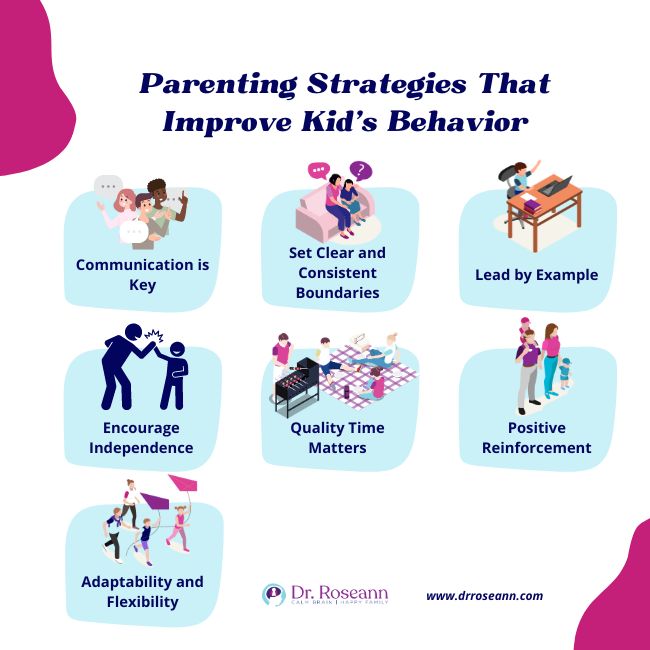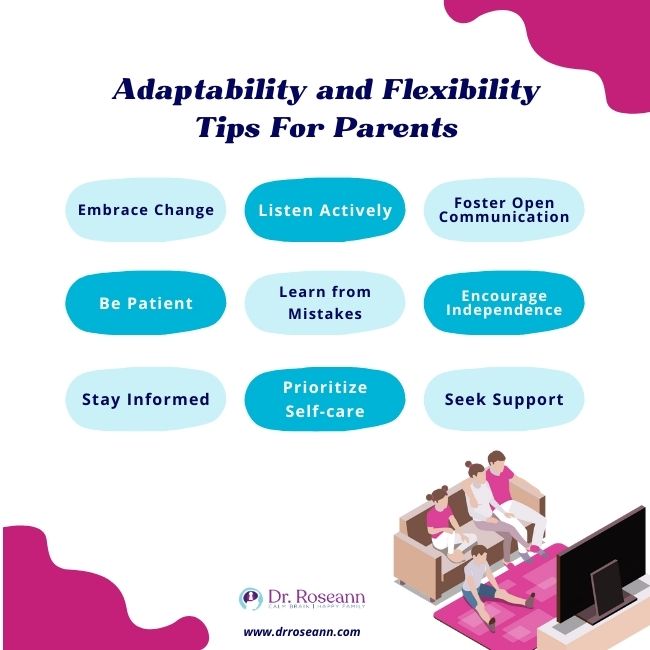Parenting is both a rewarding and challenging journey that requires dedication, patience, and a commitment to nurturing the growth and development of children. While there is no one-size-fits-all approach to parenting, incorporating effective parenting strategies can significantly contribute to fostering a positive and healthy family environment.
Working with kids and their parents for decades has shown me how parenting styles can greatly affect the way a child behaves. Delving into parenting techniques reveals how different approaches can shape our children's journeys, turning challenges into stepping stones and fostering a nurturing environment where every family member thrives.

Communication is Key
I spent over 30 years helping parents and one of my most important parenting advice is open and honest communication. Communication is the cornerstone of effective parenting. Creating an environment where children feel comfortable expressing their thoughts and feelings fosters trust and strengthens the parent-child bond (Estlein, 2021).
Actively listen to your child, validate their emotions, and encourage them to share their experiences. This not only helps in understanding their perspective but also promotes the development of essential communication skills. Do you want to know how to be a good parent? Talk to your child and understand their needs.
Set Clear and Consistent Boundaries
Children thrive in environments with clear and consistent boundaries. Establishing rules and expectations provides a sense of security and helps children understand what is acceptable behavior.
Consistency is key. That’s always my first piece of advice for new parents. Enforce rules consistently and fairly, and be sure to communicate the consequences of both positive and negative behavior. This approach helps children develop self-discipline and a sense of responsibility.
Lead by Example
Children often learn by observing their parents. Modeling positive behavior, empathy, and resilience sets a powerful example for your children to follow. The most effective parenting guidance is shown by demonstrating the values and attitudes you wish to instill in your child.
When you model good behavior, your kids are more likely to adopt the same traits in their own lives. Remember that children are keen observers, and your actions speak louder than words. That’s the right way on how to raise a child.
Encourage Independence
Fostering independence is crucial for a child's development. Allow them to make age-appropriate choices and decisions to encourage a sense of autonomy. That’s one way how to raise good kids.
This parental advice not only builds confidence but also teaches problem-solving skills. Gradually increasing responsibilities as children grow helps prepare them for the challenges they will face in life.
Quality Time Matters
In today's fast-paced world, finding quality time to spend with your children is essential. Create a balance between work, chores, and leisure to ensure you have meaningful interactions. Engage in activities that interest your child, whether it's reading, playing sports, or simply having a conversation.
Being a good parent simply means building strong connections through shared experiences that contribute to a healthy parent-child relationship. It involves not just being present physically, but also emotionally, by empathizing with your child's feelings and perspectives. These are some of the unwritten rules for parents that you should know.
Positive Reinforcement
Raising kids is hard but recognizing and reinforcing positive behavior is more effective than focusing solely on negative aspects. Praise your child for their efforts and achievements, no matter how small. This positive reinforcement boosts their self-esteem and motivates them to continue making positive choices (Seay et al., 2014).
Here’s another advice for parents: embrace positive reinforcement. It not only helps in shaping behavior but also fosters a strong parent-child relationship and creates a foundation for healthy development.
Adaptability and Flexibility
Parenting requires adaptability as children grow and face different challenges. Be flexible in your approach and willing to adjust your strategies based on your child's changing needs. Remaining open-minded and adapting to new circumstances helps create a supportive and responsive parenting environment.

Why Positive Parenting Tips Work
Understanding the different types of parenting styles and tailoring your approach to your child's individual temperament is crucial. Raising a child involves navigating various challenges, and seeking parenting help can provide valuable insights into effective parenting techniques.
Incorporating diverse perspectives and continuously adapting your approach based on the ever-evolving needs of your child showcases good parenting skills. It's essential to stay open to parental advice and continuously educate yourself to cultivate a supportive and nurturing environment for your child's growth.
Developing effective parenting skills is an ongoing process that involves commitment, love, and continuous learning. Remember that every child is unique, and there is no one-size-fits-all solution. Tailor these strategies to fit the individual needs of your child and family to create a nurturing environment for their growth and development.
What is child rearing?
Child rearing, also known as parenting or upbringing, refers to the process of promoting and supporting the physical, emotional, social, and intellectual development of a child from infancy to adulthood.
What makes a good parent?
Being a great parent means consistently providing love, support, and guidance while cultivating a nurturing environment for your child's development. Employing good parenting skills, such as effective communication and a genuine understanding of your child's needs, is essential for building a strong and positive parent-child relationship.
Are parents responsible for their children's behavior?
Parents play a significant role in shaping their children's behavior through guidance, discipline, and setting examples. While parents are influential, other factors also contribute to a child's behavior, including societal influences, peer interactions, and individual temperament.
How to be good parents?
Embracing continuous learning and incorporating sound advice for parenting will contribute to understanding how to parent well and foster a positive and nurturing environment for your child's development. Seek a comprehensive parenting guide that offers valuable tips on parenting skills to possibly become a good parent.
How to be good with kids?
Being good with kids involves implementing effective strategies for parents that focus on positive reinforcement, active listening, and creating a supportive environment while raising a family. Utilizing valuable parenting tips and seeking sound parenting advice can enhance your ability to connect with and understand children,
How should parents treat their child?
A parenting approach should involve a combination of love, support, and guidance, as emphasized in numerous parenting articles. Implementing this thoughtful parental advice and maintaining open communication contributes to fostering a healthy and positive relationship between parents and their children.
How to raise kids the right way?
A good advice for parents to be is to embrace healthy parenting practices for effective child-rearing. Prioritizing open communication, setting boundaries, and providing a nurturing environment contribute to raising kids with a strong foundation for positive growth and development.
How to be a better mom to my son?
Being a better mom to your son involves consistently being a loving parent, understanding his unique needs, and incorporating effective parenting strategies. Seek and apply great parenting advice from other parents who have a temperament similar to your son may also help.
How to raise a healthy child?
To raise a healthy child, prioritize a balanced approach encompassing physical health, emotional well-being, and cognitive development. This includes incorporating effective strategies on how to raise children, actively engaging in activities that promote a nurturing environment, and seeking good advice for new parents to stay informed and adaptable in their parenting journey.
How do I parent a neurodivergent child?
Seek guidance from professionals, engage in open communication, and actively participate in your child's education to ensure they thrive with understanding and acceptance. Parenting a neurodivergent child involves educating yourself through the best books for parents that provide insights into their unique needs and challenges and implementing a patient and adaptable parenting strategy.
How do I become a better parent?
Embracing good parenting involves continuous learning, adaptability, and fostering a positive and supportive environment for your child's growth and development. Utilize resources on how to become a better parent, focusing on effective communication, understanding your child's needs, and practicing patience. Seek valuable parent tips that encompass a range of parenting aspects.
How to raise successful kids?
Cultivate a supportive environment that encourages curiosity, resilience, and independence, incorporating tips for good parenting skills such as effective communication and setting realistic expectations. Strive to be the best parent by actively seeking and incorporating valuable parenting advice and tips.
How to explain responsibility to a child?
Demonstrate better parenting skills by modeling responsible behavior and involving your child in simple tasks. To explain responsibility to a child, employ effective tips for parents such as using age-appropriate language and examples.
What do children need the most?
Children need the most from parents who understand how to parent well by providing love, guidance, and a nurturing environment. Seeking valuable parent advice can offer insights into their evolving needs and contribute to successful parenting.
How to help kids with mental health issues?
To help kids with mental health issues, parents can focus on learning how to be a better parent by educating themselves about the specific challenges their child may be facing. Seeking the best parenting advice for new parents from mental health professionals can provide valuable insights into effective strategies and interventions. Implementing good parenting tips involves creating a supportive environment and fostering open communication.
How to raise a kid with good manners?
To raise a kid with good manners, focus on how to be a great parent by modeling polite behavior and consistently reinforcing positive actions. Embrace the best parenting style that involves setting clear expectations for behavior, providing gentle correction, and offering praise when your child displays good manners.
What is the best parenting style?
The best parenting styles vary based on individual circumstances and the unique needs of each child. It involves understanding how to be a parent by being adaptable. and responsive while fostering a supportive environment. For those entering parenthood, seeking advice from new parents can provide valuable insights into effective childhood rearing techniques and help in developing a parenting approach that aligns with the child's well-being and development.
How to be a supportive parent?
Being the best mother involves being emotionally available, actively listening to your child, and creating a nurturing environment that fosters their growth and well-being. Start by seeking the best advice for new parents to navigate the challenges of parenthood. Specifically, one can benefit from targeted advice for new moms that emphasizes self-care and the importance of seeking support.
Citations
Estlein, R. (2021). Parenting as a communication process: Integrating interpersonal communication theory and parenting styles conceptualization. Journal of Family Theory & Review, 13(1). https://doi.org/10.1111/jftr.12407
Seay, A., Freysteinson, W. M., & McFarlane, J. (2014). Positive Parenting. Nursing Forum, 49(3), 200–208. https://doi.org/10.1111/nuf.12093
Dr. Roseann is a mental health expert in Parenting who frequently is in the media:
- Seeme & Liz 12 Essential Parenting Tips For Kids with ADHD
- Sparking Wholeness (Audio) Parenting Anxious Kids.
Coronavirus with Saul Podcast Parenting when Sheltering in Place
Always remember… “Calm Brain, Happy Family™”
Disclaimer: This article is not intended to give health advice and it is recommended to consult with a physician before beginning any new wellness regime. *The effectiveness of diagnosis and treatment vary by patient and condition. Dr. Roseann Capanna-Hodge, LLC does not guarantee certain results.
Are you looking for SOLUTIONS for your struggling child or teen?
Dr. Roseann and her team are all about science-backed solutions, so you are in the right place!
Grab your complimentary copy of
147 Therapist-Endorsed Self-Regulation Strategies for Children: A Practical Guide for Parents
Dr. Roseann is a Children’s Mental Health Expert and Licensed Therapist who has been featured in/on hundreds of media outlets including The Mel Robbins Show, CBS, NBC, PIX11 NYC, Today, FORBES, CNN, The New York Times, The Washington Post, Business Insider, Women’s Day, Healthline, CNET, Parade Magazine and PARENTS. FORBES called her, “A thought leader in children’s mental health.”

She coined the terms, “Re-entry panic syndrome” and “eco-anxiety” and is a frequent contributor to media on mental health.
Dr. Roseann Capanna-Hodge has three decades of experience in working with children, teens and their families with attention-deficit hyperactivity disorder (ADHD), autism, concussion, dyslexia and learning disability, anxiety, Obsessive Compulsive Disorder (OCD), depression and mood disorder, Lyme Disease, and PANS/PANDAS using science-backed natural mental health solutions such as supplements, magnesium, nutrition, QEEG Brain maps, neurofeedback, PEMF, psychotherapy and other non-medication approaches.
She is the author of three bestselling books, It’s Gonna Be OK!: Proven Ways to Improve Your Child's Mental Health, The Teletherapy Toolkit, and Brain Under Attack. Dr. Roseann is known for offering a message of hope through science-endorsed methods that promote a calm brain.
Her trademarked BrainBehaviorResetⓇ Program and It’s Gonna be OK!Ⓡ Podcast has been a cornerstone for thousands of parents facing mental health, behavioral or neurodevelopmental challenges.
She is the founder and director of The Global Institute of Children’s Mental Health, Neurotastic™Brain Formulas and Dr. Roseann Capanna-Hodge, LLC. Dr. Roseann is a Board Certified Neurofeedback (BCN) Practitioner, a Board Member of the Northeast Region Biofeedback Society (NRBS), Certified Integrative Mental Health Professional (CIMHP) and an Amen Clinic Certified Brain Health Coach. She is also a member of The International Lyme Disease and Associated Disease Society (ILADS), The American Psychological Association (APA), Anxiety and Depression Association of America (ADAA) National Association of School Psychologists (NASP), International OCD Foundation (IOCDF).
© Roseann-Capanna-Hodge, LLC 2024










